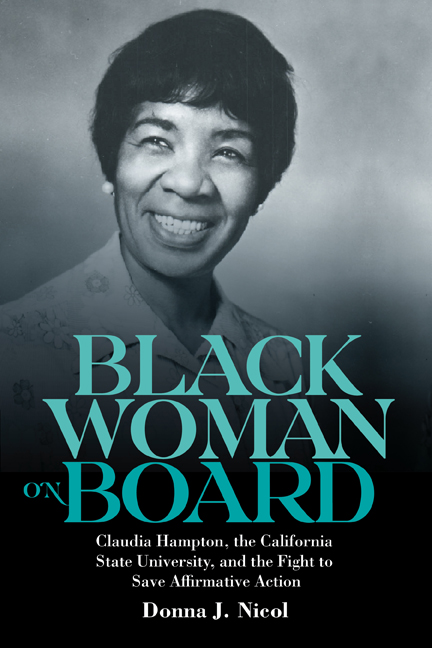 Black Woman on Board
Black Woman on Board Book contents
- Frontmatter
- Dedication
- Contents
- List of Illustrations
- Acknowledgments
- List of Abbreviations
- Introduction: A Very Fortunate Happenstance
- 1 Shifting Notions of the Public Good
- 2 Misgivings about Affirmative Action
- 3 The Conciliator Makes Dinner
- 4 A Hammer in a Velvet Glove
- 5 The Beginning of the End
- Conclusion: The Legacy and The Lessons
- Bibliography
- Appendix: Hampton’s Trustee Committee Service and Leadership
- Index
5 - The Beginning of the End
Published online by Cambridge University Press: 09 May 2024
- Frontmatter
- Dedication
- Contents
- List of Illustrations
- Acknowledgments
- List of Abbreviations
- Introduction: A Very Fortunate Happenstance
- 1 Shifting Notions of the Public Good
- 2 Misgivings about Affirmative Action
- 3 The Conciliator Makes Dinner
- 4 A Hammer in a Velvet Glove
- 5 The Beginning of the End
- Conclusion: The Legacy and The Lessons
- Bibliography
- Appendix: Hampton’s Trustee Committee Service and Leadership
- Index
Summary
Paul Bond, a staff writer for The Daily Sundial, the main student newspaper at CSU Northridge, wrote in a 1993 opinion piece entitled “Affirmative Action Is No Longer Effective” that “today, affirmative action means hiring quotas, lower standards and expectations for minorities, lawsuits where employers must prove their innocence (in direct conflict with the Constitution), race norming (artificially raising scores on aptitude tests for certain minority groups), and reverse discrimination.” To support his claims, Bond referenced the work of conservative African American scholars Thomas Sowell and Shelby Steele, arguing that affirmative action hurts African Americans. But more than simply name-dropping two African American opponents of affirmative action, Bond claimed that “currently, about three quarters of African American college students drop out before graduation, including thousands from elite colleges,” without offering any evidence to support his claims.
Bond could get away with making such unsubstantiated claims about affirmative action, since public support for legislation and programming to promote educational equity started to wane in the early 1990s. Campus newspapers throughout the Cal State system, and mainstream dailies like the Los Angeles Times and Washington Post, regularly ran articles and opinion pieces during this period lambasting affirmative action and ethnic studies curricula as part of a multicultural movement that had gone too far. Critics of affirmative action claim that colleges and universities lowered standards and denied qualified white students access to the nation's colleges and universities in favor of less-qualified minority students. The end result of these special overtures to racial and ethnic minority students was a growing resentment by white students and working-class white voters, who saw affirmative action as a threat to their chances of getting an education and a good job. In this chapter I examine the impact of the culture wars on educational policymaking within CSU, culminating in the death of affirmative action with the passage of Proposition 209 in 1996, just two years after Claudia Hampton's death from lung cancer.
White resentment towards affirmative action had been a reality since the inception of this legislation, reaching fever-pitch with the Bakke decision in 1978. However, it was not until the early 1990s that the Republican Party began making race, multiculturalism, and affirmative action the centerpiece of their 1992 election campaign.
- Type
- Chapter
- Information
- Black Woman on BoardClaudia Hampton, the California State University, and the Fight to Save Affirmative Action, pp. 165 - 190Publisher: Boydell & BrewerPrint publication year: 2024
